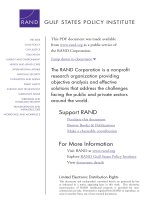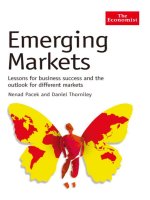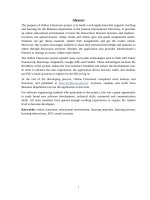Emerging markets lessons for business success and the outlook for different markets
Bạn đang xem bản rút gọn của tài liệu. Xem và tải ngay bản đầy đủ của tài liệu tại đây (805.56 KB, 225 trang )
EMERGING MARKETS
OTHER ECONOMIST BOOKS
Guide to Analysing Companies
Guide to Business Modelling
Guide to Business Planning
Guide to Economic Indicators
Guide to the European Union
Guide to Financial Markets
Guide to Management Ideas
Numbers Guide
Style Guide
Dictionary of Business
Dictionary of Economics
International Dictionary of Finance
Brands and Branding
Business Ethics
Business Strategy
China’s Stockmarket
E-trends
Globalisation
Successful Innovation
Successful Mergers
Wall Street
Essential Director
Essential Economics
Essential Finance
Essential Internet
Essential Investment
Essential Negotiation
Pocket Asia
Pocket Europe in Figures
Pocket World in Figures
EMERGING MARKETS
Lessons for business success and
the outlook for different markets
Nenad Pacek
and
Daniel Thorniley
THE ECONOMIST IN ASSOCIATION WITH
PROFILE BOOKS LTD
Published by Profile Books Ltd
58A Hatton Garden, London ec1n 8lx
Copyright © The Economist Newspaper Ltd 2004
Text copyright © Nenad Pacek and Daniel Thorniley 2004
All rights reserved. Without limiting the rights under copyright reserved above, no
part of this publication may be reproduced, stored in or introduced into a retrieval
system, or transmitted, in any form or by any means (electronic, mechanical,
photocopying, recording or otherwise), without the prior written permission of both
the copyright owner and the publisher of this book.
The greatest care has been taken in compiling this book.
However, no responsibility can be accepted by the publishers or compilers
for the accuracy of the information presented.
Where opinion is expressed it is that of the authors and does not necessarily
coincide with the editorial views of The Economist Newspaper.
Typeset in EcoType by MacGuru
Printed in Great Britain by
Creative Print and Design (Wales), Ebbw Vale
A CIP catalogue record for this book is available
from the British Library
ISBN 1 86197 408 6
Contents
Preface vii
Part 1 Lessons for business success 1
1 Why companies fail 3
2 Managing corporate expectations 11
3 Market entry preparation 18
4 Market research and business intelligence 28
5 Assessing political risks 32
6 Interpreting economic indicators 38
7 Eternal dilemmas: market entry, corporate structure, marketing 49
8 Reaching the local market 58
9 Manufacturing in emerging markets 65
10 Making acquisitions work 72
11 Dealing with corruption and crime 94
12 Human resources: myths and reality 103
13 Corporate social responsibility 109
14 Understanding and coping with emerging-market crises 115
Part 2 The outlook for different markets 129
15 The global economy 131
16 The business outlook 148
17 Russia: a detailed look 175
Appendices
1 Comparative tables 196
2 References 204
v
This page intentionally left blank
Preface
J
ust look at these newspaper headlines: “L’Oréal Says Net Climbed 20%
on Strong Emerging Markets”; or “Emerging Markets Enable Nestlé to
Lift Earnings 13%”; or “Chinese Growth Helps to Lift Coke Earnings”. A
glance behind the scenes reveals that L’Oréal’s growth in China, for
example, has more than tripled since 1997, its Russian business is grow-
ing more than 50% per year and its sales in most other leading emerging
markets are growing well over 20% a year.
There is no doubt that emerging markets offer enormous opportuni-
ties to companies with strong growth ambitions. But although some
companies perform well in emerging markets, many that are equally
ambitious end up frustrated and far from reaching their initial targets.
The aim of this book is to help businesses avoid the mistakes many
multinationals have made in emerging markets. It covers everything
that businesses need to think about, understand and act on in order to
be successful in emerging markets. Real corporate experiences are used
wherever possible to illustrate the points made and we are grateful and
indebted to the many executives who over the years have shared with
us their lessons of business success and failure in emerging markets.
There are many references to conversations with and remarks made by
them, but as a professional courtesy and because it makes no difference
to the points we illustrate, we have chosen not to give names even
when conversations were on the record. Where names do appear, the
remarks and quotations were not made to the authors personally and
are in the public domain.
We are grateful to our former colleague and friend, Jeremy Kourdi, who
encouraged us to write the book; to Delia Meth-Cohn, who helped edit the
book, provided additional examples and advised on the book’s structure;
to colleagues in The Economist Corporate Network, Asia, for insights into
business in South-East Asia; and to Stephen Brough, Penny Williams and
Martin Liu for the parts they have played in the book’s creation.
We are also keen to hear from anyone who would like to share their
experiences of emerging markets or would like to know more about
The Economist Corporate Network. You can email us on nenadpacek
@economist.com and
Nenad Pacek and Daniel Thorniley, March 2004
vii
this book is dedicated to
my wife, Antonia, and daughter, Nina,
and to my parents and sister (NP)
my wife, Maria, and daughter, Natasha, and to my parents,
Harry and Irene, and brother, Paul (DT)
1
LESSONS FOR BUSINESS SUCCESS
This page intentionally left blank
1 Why companies fail
If I want sustainable profits, I am going to invest in the longer term, even if it
has a negative impact on the short term. For some of the members of the
financial community, whose timeframe is between half a year and a year, it is
very difficult to explain what it means to build up a business in Korea or China or
Russia, where you have to invest for five to ten years before you get into
profitability.
Peter Brabeck, CEO of Nestlé, who refuses to give short-term financial targets to analysts.
Nestlé has had a total annual shareholder return of 16.8% over a ten-year period and
emerging markets account for 25% of its total global sales.
It does not matter how much it costs. What matters is how much money it can
make.
Roberto Goizueta, former CEO of Coca-Cola. (Coca-Cola is still the most valuable brand in
the world. Since December 2002 it has refused to give quarterly and annual sales
expectations to analysts.)
M
arket leaders in their sector in the developed world often set out to
repeat their success in emerging markets, and seemingly put a lot
of resources into achieving their aim. This chapter looks at the reasons
so many fail – and what can be done to make sure they do not.
Growth is a corporate obsession. For many companies, one of the
best ways to achieve steady organic growth is through steady geo-
graphical expansion. Coca-Cola’s share price jumped 3,500% between
1981 and 1997, for example, as the company almost quintupled in size,
mostly thanks to bold investments in emerging markets. But time and
time again firms that are market leaders in the developed world fail to
replicate that success in emerging markets. Why? And what can compa-
nies do about it?
The problem typically starts at the top of the corporate hierarchy. A
typical scenario goes like this. A ceo sends a manager that he knows
and trusts to start “conquering” a group of countries in the developing
world. This manager ends up operating from a regional hub. He visits
the countries he is interested in, establishes contacts and collects rele-
vant information. He spends months evaluating potential distributors
and partners. He decides who he wants to work with and signs the con-
tracts. Sales begin. He hires a few people in the hub to co-ordinate the
3
effort. Sales pick up. He is excited. Business is going well. “We are in. The
sky is the limit”, or so he thinks.
A year later he is holding a report on market shares. “How can this
small player be ahead? Why am I still so far behind?” His ceo calls and
says: “I’m looking at the report. It is not bad. But I would like to see us
becoming much more dominant next year.”
Another year on, the position is much the same. Business is slightly
up but not relative to the competition. This time the ceo is less relaxed:
“You said you were going to increase our market share. What’s wrong?”
This is when the regional manager usually says: “I think I’ll need more
resources to build the business. People don’t seem to know our brands
here.”
The ceo’s response is: “Prove to me there is more business there and
you’ll get more resources.” To which the inevitable riposte is: “How can
I increase sales if you don’t allow me to invest more?”
Getting out of this vicious circle is never easy. The following guide-
lines show how a firm can avoid getting into it and improve its chances
of being successful in an emerging market.
Ensure there is genuine commitment from the very top
Senior management must be absolutely committed to an emerging-
market business. It must commit sufficient resources to getting it estab-
lished and then to sustaining and growing it. Building business in
emerging markets is never a short-term affair; the ceo and the board
must be prepared to lose money for a number of years. In companies
that prove successful in emerging markets, it is common that once a
strategic commitment has been made, the ceo appoints a trusted senior
manager who is powerful enough to override internal obstacles and to
make investment decisions according to market needs. He champions
and drives the emerging-market business. ceos of companies that are
successful in emerging markets have often made a point of convincing
analysts and shareholders about the benefits of the long-term growth
that emerging markets can help provide. Companies that focus on short-
term profit maximisation are typically less successful in emerging mar-
kets, even if their products dominate the developed world.
Never take market leadership for granted
Just because a company is a market leader in the developed world, it
does not mean that it will become a market leader in an emerging
market. Consumers in emerging markets are often unaware of a newly
4
EMERGING MARKETS
available product or of its brand recognition in the developed world.
Companies that are early into the market and put resources into skilful
brand building and local presence usually end up dominating the
market, even if they are small, local players. Multinationals that under-
estimate the potential competition from smaller international and
domestic competitors do so at their peril.
Toe-dipping often backfires
Either go for it or stay out. Half-baked entry and market testing is dan-
gerous. John Menzer, who took over Wal-Mart’s international opera-
tions in 1999, told the Financial Times in early 2003:
No more flag-planting and opening a few stores to test out the
market. Now when we decide to go into a new market, we are
going to go in with enough mass that we can use our core
competences.
Wal-Mart learned some bitter lessons in several markets in Latin Amer-
ica where it was beaten by smaller European competitors. While the US
giant was testing the market, Europeans were developing it at full speed
and now enjoy the benefits of that approach.
Don’t let economic crises interfere with strategy: adjust
performance criteria
A Dow Chemical regional executive for Europe, Middle East and Africa
says:
Our company accepts that there are regular setbacks and
crises in emerging markets. We know that most of these crises
are largely crises of progress and we do not really adjust our
overall strategic approach. We adjust our tactics but we are
never really concerned about crises. They come and go and we
are here to stay.
Economic and political uncertainties can easily disrupt quarterly and
even annual plans. This goes with the territory and many companies do
not even adjust their cost structure in times of downturn, knowing that
this can damage the business once the crisis is over. The wisdom of this
approach was demonstrated after the 1998 rouble crisis in Russia. In a
Wall Street Journal interview in 2002, Peter Brabeck, ceo of Nestlé, said:
5
WHY COMPANIES FAIL
If I had only thought about short-term profit margins, I would
have withdrawn from Russia, like everybody else, during the
Russian crisis. We did not. It very clearly had an impact on my
profit margins, but in 18 months we doubled our market share.
This is the difference between short-term profit margin
maximisation and long-term, sustainable profitable growth.
It is immensely frustrating for regional managers to be criticised for
missing quarterly budgets during crises. Performance criteria should be
focused on sustainable, medium- to long-term results, not the next
month or quarter. Likewise, management incentive schemes should be
related to longer-term results.
Be early to market and go for it
As emerging markets mature, it becomes harder to persuade consumers
to switch brands and take market share from established products, as it
is in the developed world where firms celebrate if they manage to
increase their market shares by 0.5% in a year. What surprises many
companies is how quickly a competitive business environment can
develop in emerging markets, despite their relative lack of economic
sophistication and occasional crises. Companies that allow other play-
ers to dominate the market for too long (through a half-hearted
approach or by late entry or both) always find it difficult to turn things
around. While mighty Wrigley dithered about expanding into Russia,
for example, Dandy, a small privately held Danish company, captured
almost the entire local market. It took Wrigley years and millions of dol-
lars to catch up.
Be flexible
Unwillingness to change long-standing practices is probably one of the
largest obstacles to success in emerging markets. Different markets
require a temporary or even lasting departure from the ways in which a
company is used to operating. Rather than saying “We don’t do this any-
where in the world”, several carmakers gave up their long struggle to
find local partners and extended their operations to include sales and
distribution of their products. This flexibility was driven by the realisa-
tion that they would not succeed without fully committed partners. By
taking control, they were able to establish lasting and sustainable
market leadership quickly. Such flexibility does not have to be costly; it
just has to be creative. When Ford could not find a distributor in
6
EMERGING MARKETS
Bulgaria it asked its German distributor to do the job. Two years later
(while competing carmakers were still searching for good local part-
ners), Ford had a dominant market lead.
Adapt to the market
Customers are often more price-sensitive in emerging markets, but
many companies stick to their product portfolio and pricing structures
instead of adapting their products and marketing to take local sensitivi-
ties into account. As a result, their market share remains small compared
with lower-priced competitors offering products that local consumers or
businesses prefer to buy.
Localise decision-making and empower regional and country
managers
One of ibm’s regional bosses for Central Eastern Europe, Middle East
and Africa (ceemea) says he constantly has difficulties moving corpor-
ate decision-making forward. Senior management is slow to allow local
managers to step up business development. He comments:
We should just let our country managers run the show as they
see fit based on local circumstances. We as a centre can
provide guidance, all kinds of support and teach them lessons
of success and failure from other markets.
It is clear that companies that give more decision-making power to
their local managers – particularly in marketing, sales, pay and bonuses
– usually do better than the centralisers. However, companies that leave
all the decision-making to their local partners are often just saving on
costs. It is local underinvestment that explains what distinguishes losers
from winners.
Underinvestment is often a result of focusing on short-term rather
than longer-term results, especially in listed companies. Roberto
Goizueta, former ceo of Coca-Cola, who championed investments in
emerging markets, was famous for taking issue with analysts when they
criticised the company for its quarterly earnings and “reckless invest-
ments”. He also made his regional managers accountable for three-year
results (not one quarter or one year). When Goizueta took over as ceo,
he was stunned to discover how little say the company had about how
its product was marketed around the world because of its reliance on
partners to look after such things.
7
WHY COMPANIES FAIL
Pay attention to organisational structure – and even more to
processes
Many companies discuss at length what kind of organisational structure
they should employ in emerging markets. They focus on location of
offices, reporting lines and where certain business functions should be
located. These are all relevant considerations – and for more on corpor-
ate structures see Chapter 7.
But what many companies (even those who understand the impor-
tance of having an excellent local presence) ignore are the organisa-
tional processes. Local managers should be made accountable for results
but given considerable freedom of action. Goizueta had the following
message for Coca-Cola’s regional and local managers:
I want you to tell me what you need to do to expand your
business, what kind of capital you need to do so, and what
kind of net return you’re going to get.
Another good example is GlaxoWellcome (now GlaxoSmithKline),
which allowed its local managers to decide what was the best way to
spend investment money, as long as they met agreed returns on invest-
ment and stuck to broad corporate guidelines. Once headquarters
started to get more involved, the performance suffered.
Recognise that a worldly business requires worldly people
The senior managers who are making the overall decisions about
emerging-market investments must feel comfortable in these places.
They need to have a sufficiently international perspective, to have trav-
elled and had experience of operating internationally. The closer to the
market a manager is operating, the more important it is that he has a
good understanding of the local market, culture and language. It is still
fairly common for a company’s emerging-markets business to be run by
people who had never even been outside the developed world before
their appointment to run an emerging-market business. Such people
start with a handicap that is not easy to overcome.
Don’t ignore small markets – they can offer rich opportunities
A regional boss at Oracle says:
A $10m contract from the government of Albania is the same
as a $10m contract from the government of China. We don’t
8
EMERGING MARKETS
want to let our competitors get that kind of money. At Oracle
we say that no market is small, because our competition is there.
The lack of competition in many small markets means that early
entrants and companies focusing on building a strong local presence
often earn fantastic returns on investment. In the poorest countries of
Sub-Saharan Africa, for example, one mobile telecoms company has
made a return on investment that is six times the level it achieved in
richer South Africa.
Know what you are getting into
Few companies have the resources to develop all markets at the same
time. So a company needs up-to-date knowledge of external conditions
to decide and plan the geographical order in which it should expand its
operations. Such knowledge takes time and money to acquire, but in
emerging markets there is also the difficulty that reliable data are often
hard to find. As a result, instinct or gut feeling plays an important part in
decisions to expand into developing countries. Companies can become
more comfortable with such decision-making by, for example, building
relationships and networks with people already operating in the mar-
kets in question. This is a great help in testing assumptions and in dis-
covering the realities of a market.
Know or anticipate what others are getting into
When companies prioritise the markets they are considering entering,
they often do so on the basis of a few key economic indicators. This pro-
duces hotspots, with many players pouring into some markets and few
into others. For example, as a regional star, Hungary attracted all the
major players in the mid-1990s, creating one of the tightest, most com-
petitive markets in Europe where many firms struggled to make any
money. However, companies which anticipated how crowded the Hun-
garian market was going to become and opted to invest more in Russia
found themselves in a market that offered less competition, higher mar-
gins, quicker profits and more scope to build market share and brand
loyalties.
Assess and address the internal constraints
It is essential to work out what resources the company does not have
but will need to carry out its emerging-market strategy. These may be
financial, product-related or human.
9
WHY COMPANIES FAIL
Set high standards and benchmark against the best
Successful companies frequently ask themselves what ideal they are
aiming at in emerging markets. They set criteria and then see what they
can learn from the companies that are best for each criterion.
Understand that business in emerging markets is more time-
consuming
Everything takes longer than in the developed world. Dealing with local
authorities, customs clearing or getting a simple licence can take days or
weeks. Since time is money, companies should understand the pace at
which it is possible to run the business and budget money and time
accordingly.
Don’t ignore emerging markets because you think they are too
small
With low economic growth and increasing pressure (for most busi-
nesses) on profit margins in the developed world, emerging markets can
offer higher margins and higher growth.
Never take your eye off the ball
It is really all about being thorough, and these guidelines are a good
start. Companies that are not constantly alert risk failure and damage to
their brands. If Mercedes had waited for its distributor to build a service
facility in Moscow instead of taking control and building a facility itself,
it might have taken years to recover from the brand damage the com-
pany would have suffered. (See Chapter 8 for more on reaching the
local market and distribution issues.)
10
EMERGING MARKETS
2 Managing corporate expectations
I never attempt to make money on the stockmarket. I buy on the assumption
that they could close the market the next day and not reopen it for five years.
Warren Buffett
The fish rots from the head.
Old Chinese saying
B
usiness in emerging markets rarely succeeds if it is subjected to the
short-term criteria that companies in the less volatile developed
world are often judged by. But many chief executives of listed compa-
nies are unwilling to adopt longer-term targets. Managing the expecta-
tions of senior management is one of the top three critical issues for
developing a healthy business in emerging markets. This chapter
explores strategies to overcome in-built short-term perspectives and to
manage the expectations of not only board members but also invest-
ment analysts and the media, whose perceptions of a company are cru-
cial in determining its reputation and share price.
If you look at how companies have gone about building and sus-
taining their business in emerging markets, two facts invariably
emerge. A short-termist approach succeeds only in the short term.
Private companies, or those not dependent on equity markets,
almost always build stronger and more sustainable businesses than
listed companies.
A short-term approach to building business in emerging markets is
the most frequent cause of longer-term failure. When companies fall
behind their more systematic competition, regional and country man-
agers often criticise their ceos for not releasing enough resources to
build the business properly. Many privately accuse their ceos of caring
only about the next set of quarterly results.
That ceos take a short-term approach is not surprising for two rea-
sons. First, reward systems have increasingly favoured those who max-
imise short-term profits. Second, the complexity and pressure of running
large corporations have steadily decreased the shelf-life of the average
ceo. Consultants at Booz Allen Hamilton reckon that the average tenure
of ceos for the world’s 2,500 most valuable companies had fallen to
7.3 years in 2001, compared with 9.5 years in 1995. And markets give an
11
average ceo less than 19 months to increase the share price, according
to Burson-Marsteller, a public relations company.
To the detriment of the long-term well-being of their corporations, a
number of ceos have come to see their job as maximising short-term
profits while in charge. This growing short-termism in the past two
decades is one of the reasons that only 40% of Fortune 500 companies
in 1980 are still on the list today. The stockmarket madness of the late
1990s, where many tried to inflate profits via creative accounting prac-
tices, is just an extreme symptom of the same disease.
In the past two decades compensation systems for ceos have largely
been based on stock options and bonuses based on short-term profit
maximisation. Rewards go to those who move the stock price up in the
short term. Many ceos choose not to miss a large annual bonus or a
mega stock-option deal by investing in something that will bring returns
3–5 years later. In such companies, emerging-market business suffers the
most. Success in emerging markets requires a passion for systematically
building business and investments that will not bring in profits next
quarter or even in the next three years. Unfortunately, investing for the
medium to longer term has increasingly been viewed as a cost that
squeezes the all-important short-term profits.
Short-termism reached its peak during the stockmarket bubble of the
late 1990s. Many ceos of listed companies, particularly in the United
States and the UK, were under pressure to provide high short-term
returns to their increasingly impatient shareholders. Managers operating
in emerging markets found themselves (and many still do) impossibly
pressured by the contradictions in overall policy. On the one hand they
were being told to increase growth (and short-term returns); on the other
hand they were being refused the resources to systematically build up
business.
Many well-run companies’ stock prices were (and continue to be)
severely punished for missing expected quarterly earnings by an unfor-
giving Wall Street, as if such results really mattered for the overall
soundness and future prospects of the business. Good decisions aimed
at building a sustainable business are rarely rewarded by the herd-like
behaviour of large institutional investors. Although this attitude has
started to change following the bursting of the stockmarket bubble,
short-termism among investors, and subsequently ceos, remains alive
and kicking. Fund managers and analysts are frequently rewarded on
how well they do in one quarter and how well they predict quarterly
earnings. This contributes to the steadily growing and damaging phe-
12
EMERGING MARKETS
nomenon of herd behaviour. “I buy because others do. I sell when I see
that others sell,” is how one youngish fund manager described how he
worked.
Read the transcripts of ceos’ conference calls with stock analysts
and it is clear that business decisions relating to the future development
of publicly listed companies are largely irrelevant. A recent study
reported in the Harvard Business Review in June 2001, done by doctoral
candidates at New York University’s Stern School of Business, found
that more than 90% of analysts’ questions to ceos during conference
calls were about expectations for the next quarter’s earnings. Invest-
ments were treated as factors that might jeopardise this “holy” quarterly
number. Analysts’ behaviour is unlikely to change. They cover many
companies, and according to one analyst: “There is really no time to
properly research, analyse and think.”
No wonder the managers who are in charge of real business deci-
sions are immensely irritated by analysts. A senior executive from one
of the 100 largest corporations in the world (and a rare highly successful
company in emerging markets) said in a private conversation:
These 26-year-olds, who have never run any business, come to
us and interrogate us like the Gestapo. They are not interested
in how we build business or what we are trying to do. And the
day after they reveal our plans on CNBC, another damaging
influence by the way. Because we told them about our
investments our share price went down 15% in a few hours.
We should do what XYZ does – give them a vague idea what
the plans are and tell them to go to hell.
The impact of all this on business is clear. Many companies have post-
poned relevant or even crucial investments for their future, and some
will have trouble surviving as years go by. One regional executive says:
We make an enormous number of business decisions that I
would never do if I were a sole owner of this business. But our
top management is more obsessed with the steady growth of
quarterly earnings than investing for the future. We will soon
run into severe problems.
Short-termism is problematic for sound business decision-making in
general. But for decision-making in emerging markets it is disastrous.
13
MANAGING CORPORATE EXPECTATIONS
Many companies invest too little in preparing for market entry (relative
to the best competition) or have inadequate resources to execute sound
market entry and market expansion plans (see later chapters).
So how do emerging-market managers go about managing the expec-
tations of senior management? First they should go through the check-
list in Chapter 3 and fight to get the resources to prepare each aspect of
market entry properly. Without thorough preparation, any manager will
have a hard time growing an emerging-market business, and the task of
managing the ceo’s expectations will become monumental.
Emerging markets are often more volatile than developed markets.
There are years that are spectacularly good but they usually do not last.
How can emerging-market managers predict the sustainable annual
growth of business over, say, the next five years? How do they explain
the inevitable ups and downs, and how do they get senior management
to accept that next year may not be as good as the previous one?
There is a tendency for ceos to say: “Your business jumped 55% last
year. You can do better than that or at least as well.” Emerging-market
managers need to communicate constantly what is shaping their busi-
ness, taking care to point out why a certain level of performance may
not be sustainable and the factors and risks which might set things back.
Equally, senior management needs to be made aware that there are
years when sales fall to unexpectedly low levels, usually because of
some kind of emerging-market crisis (see Chapter 14). As with good
years, the circumstances that made a year a bad one usually do not last.
Markets bounce back sooner or later. Many short-termist companies
react to such crises by radically downsizing operations. Although this
provides short-term protection, it may have negative implications in the
longer term (see Chapter 14).
Many ceos push regional managers to work to stretched budgets,
which simply increases the stress of working in a volatile and difficult
to predict market. Or it is counterproductive because managers simply
ignore the budget as it does not take into account the realities of the
market. The message from the top is often: “You claim there is a lot of
potential in emerging markets, let’s see it.” And that is regardless of the
fact that the risk and uncertainty as well as the potential have been
pointed out.
One problem is that many companies push managers to deliver big
returns before enough has been invested in establishing local market
presence and securing brand recognition. But even in companies that do
invest in what they need to, budget games are rampant. Those who meet
14
EMERGING MARKETS
and beat budgetary targets (regardless of how low they were set) are usu-
ally regarded as better managers than those who grow a business faster
year on year but keep missing their unrealistic budgetary targets.
Many potentially productive hours of work are wasted on tactics for
meeting budgetary expectations. As the regional manager of a large
American company says: “I spend too much time managing the bottom
line instead of managing the business.” Studies by Wharton business
school show that setting what managers perceive as overly ambitious
goals distorts their behaviour and ultimately damages their companies.
Managers start playing games. If they see they can exceed the stretch
budget, for example, they try and delay end-of-year sales so they are
booked in the next year. They fear that fantastic growth will earn them
an even worse budgetary target next year, and they also want to have a
good start to the year. Some managers even give up hard work “to prove
that the target was crazy” and to play down expectations for the next
year. As one manager who lost his job after proving that the target was
crazy said: “I lost my job but at least I’ll stay sane.” The volatility of
emerging markets makes the requirement to meet demanding budgets
particularly stressful for local and regional managers, with the result
that they are even more likely to behave in ways that are not in the best
long-term interests of their firms.
Budget games are a fact of corporate life, but for emerging markets
the following approach is a good one to adopt.
Determine the sustainable level of business growth in a given
market
This assessment should be based on at least three factors: past results (if
any); a thorough understanding of the external environment and the
risks it carries; and a clear view of the internal capabilities and resources
(see Chapter 3).
Decide whether you can communicate this analysis openly
Depending on the company culture and the ceo, some managers are
able truthfully to communicate this sustainability analysis to their
senior management. But in many companies it is not possible for at least
two reasons. One is that pay and bonuses are linked to exceeding tar-
gets, and furthermore, missing a target can lose you your job or damage
your career.
As a result, many companies have developed a corporate culture of
deceit and caution. If a manager thinks his business in an emerging
15
MANAGING CORPORATE EXPECTATIONS
market can grow 30% next year, he will tell his senior management that
a sustainable rate of growth is 15% plus, while pointing out a whole set
of things that can potentially destroy even this 15% growth rate.
Point out all risks to the main scenario
Clearly outlining risk factors, as a footnote to the budget and business
plan, is a smart thing to do in emerging markets regardless of whether
a company encourages and rewards truthful communication or is
infested with a culture of deceit. In both cases, senior management
needs to be aware of the things that can go wrong. There is no shortage
of risks in emerging markets. Many companies active in them say that
the single biggest risk affecting their emerging-market plans in the last
decade was the unpredictability of currency devaluations. Managers at
Sony say that they fear unpredictable recessions and unpredictable con-
sumer behaviour. In many countries, managers worry about political
risks and the way they affect sales. In years of uncertain elections, for
example, consumers’ appetite for spending often shrinks. Perhaps the
most worrying thing for many companies is that the list of largely
unpredictable market threats is long, even in reasonably well managed
emerging markets. The Mexico crisis in 1994 moved the country from a
star to a short-term basket case in a matter of weeks, for no good fun-
damental reason (see Chapter 14).
Make sure senior management understands and accepts
volatility
One of the most important things for senior management to accept is
that emerging markets are volatile. Regardless of how much money is
invested and regardless of the quality of the people running the opera-
tion on the ground, there will be bad years and there will be good years,
even spectacular ones. Also keep in mind that not all global emerging
markets are down at the same time. The encouraging news is that there
are, in virtually all emerging markets, more good years than bad ones. In
other words, there is steady long-term growth of revenues and profits.
But both good and bad years often come unexpectedly, despite the
efforts of forecasters to predict the future.
Establish different performance criteria for emerging markets
Managers operating in emerging markets need to be judged according to
different criteria from those operating in developed markets. Perform-
ance criteria should focus on sustainable medium- to long-term results.
16
EMERGING MARKETS









